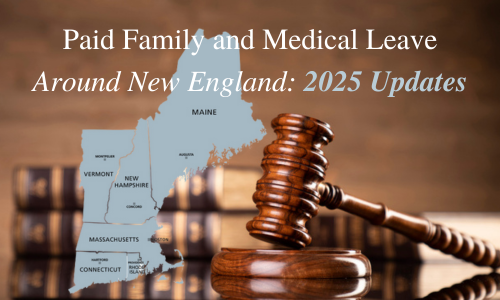Paid Family and Medical Leave Around New England: 2025 Updates
 The Paid Family and Medical Leave (PFML) landscape has become increasingly complex as states propose a variety of paid leave laws across the country, even though there were no new mandatory programs enacted in 2024. Multiple states are, however, working to finalize regulations and establish their PFML programs, beginning to collect contributions in 2025, and preparing to pay benefits in 2026. In addition, while various federal programs have been proposed with the goal of aligning practices across states, there has been little movement; and we expect, with the new administration, the stalemate will continue.
The Paid Family and Medical Leave (PFML) landscape has become increasingly complex as states propose a variety of paid leave laws across the country, even though there were no new mandatory programs enacted in 2024. Multiple states are, however, working to finalize regulations and establish their PFML programs, beginning to collect contributions in 2025, and preparing to pay benefits in 2026. In addition, while various federal programs have been proposed with the goal of aligning practices across states, there has been little movement; and we expect, with the new administration, the stalemate will continue.
Outside of New England, California, Colorado, Delaware, Hawaii, Maryland, Minnesota, New Jersey, New York, Oregon, Puerto Rico, Washington, and the District of Columbia have mandatory paid family and/or medical leave laws in place. Employers should be aware of all paid leave laws for the jurisdictions in which they have employees working and ensure they comply with any and all applicable regulations.

